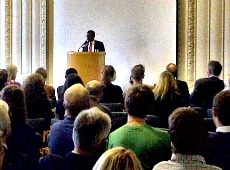The Maldives’ Police Service has denied arresting approximately 50 people – primarily Maldivian Democratic Party (MDP) supporters – the night prior to President Mohamed Waheed’s arrival in Addu City yesterday (May 8).
President Waheed visited Addu to inaugurated the Hulhumeedhoo road development project, open the Hulhudhoo pharmacy and inaugurate higher secondary education at Seenu Atoll School, according to the President’s Office.
During the ceremony for the former Dr Waheed “highlighted the importance of developing roads on the bigger islands for the development of the atoll. In this regard, the President said the government’s aim was to complete such developmental endeavors without any interruptions.”
Addu City Mayor Abdulla Sodig told Minivan News the night before Waheed’s arrival close to 50 people were arrested, “and about 90 percent of those taken in were MDP supporters”.
“The police knew who had been actively engaged in [MDP] demonstrations and targeted those individuals. Those who were arrested were having coffee in restaurants, standing having a chat outside, others were stopped at vehicle checkpoints. They were arrested for allegedly being ‘a member of a gang’,” he added.
A few of the individuals arrested were released after one or two hours, according to Sodig.
“People know this game because it was the game [former President Maumoon] Gayoom played. They know they were arrested because of Waheed’s visit,” Sodig said.
“Police probably purposefully did this negative campaign. But Waheed’s game has backfired. Families of the arrested individuals are really angry and frustrated,” he added.
As part of an ongoing police operation in Addu to “keep the peace”, “lots of people were taken into custody and were released after their information was collected”, the Police Media Official who spoke with Minivan News today (May 9) initially stated.
The official then refuted the statement, claiming that only one person was arrested in Addu City on May 7.
The official confirmed that being “arrested” and “taken into custody” have the “same meaning”.
However, a police media official told local media outlet CNM that “people assembled in groups and other suspects were taken in for questioning last night. He said that they were all released except for one who is being held for issuing a death threat to a policeman.”
Mayor Sodig explained that the Addu City Council was not notified about this ‘special operation’.
“Normally the commander(s) visit and explain the details when a special operation is going to take place,” Sodig said. “During last week’s fortnightly meeting [with the council] the police did not mention such an operation was planned.”
“The [city] council is gravely concerned by these developments,” Sodig told local media.
Approximately 30 were arrested from Hithadhoo Island, more than 10 from Feydhoo Island and around 10 from Maradhoo Island, all part of Addu City’s administrative district, according to local media.
These arrests were made under the “’Our Peaceful Addu City” operation, which has been continued by the police services to make the atoll “crime free”.
Police ‘star force’ out of control
“Addu City has the largest population outside of Male’ [approximately 35,000 people], as well as a very large land area, and so much is happening now,” Sodig explained. “We have to have a police presence not only in namesake or to run the desks, but enough to oversee the whole area.”
“Usually there are 15 to 20 police officers in each of the three stations in the area, however this is not enough, so we requested the police provide extra strength to increase numbers to about 30 per station,” he continued.
 “The special operations team [responded by] sending their ‘star force’, but they don’t have their commander here. He’s not in control of this group or operations. Instead they are directly overseen by Male’ command,” said Sodig.
“The special operations team [responded by] sending their ‘star force’, but they don’t have their commander here. He’s not in control of this group or operations. Instead they are directly overseen by Male’ command,” said Sodig.
“That’s the reason why we don’t want them to continue,” he declared.
The task force consisting of 50 special operations police was started in January 17, 2013 and was supposed to end April 17, according to Sodig. However, the entire special operations force has remained in Addu City, targeting those allegedly involved in drug and gang issues.
“Dream on Waheed”: Sodig
During Waheed’s visit to Addu City, he stated that the Maldives not only has two ideologies – Islamic and anti-Islamic – but a third “ideology of unity” which was evident in Addu City.
He made the remarks after seeing a “Unity Jagaha” (campaign office) on Hulhumeedhoo Island in Addu, according to local media.
Last month President of the Progressive Party of the Maldives (PPM) and former president, Maumoon Gayoom, claimed the Maldives was now dominated by people belonging to the “Islamic” ideology and those belonging to the “anti-Islamic” ideology.
Waheed also said that prior to his visit to Addu, “he had received information that a certain group was ‘very strong’ in Addu City, however, his team received greater support than he had expected.”
Waheed was informed that MDP support in Addu was very strong, but that’s not what he has seen, according to Mayor Sodig.
“Dream on Waheed,” Sodig declared. “He doesn’t have much support here, it is not close to [former President Mohamed] Nasheed, Maumoon, or [Abdulla] Yameen supporters.”
Sodig explained that paid government employees were ordered to receive Waheed at the airport, which is abnormal.
“This is the game Mamoon played during his [30 year] term,” said Sodig. “During Nasheed’s government this kind of thing never happened.”
“There were only 100 or 200 people to receive Waheed. There were some supporters from his united coalition with Adhaalath Party (AP) and Yameen supporters. However, people from all government agencies in the area, all paid staff, were told to receive him,” Sodig said.
“This includes senior government officials, senior civil servants – informed by the Civil Service Commission, all the schools’ senior management and non-teaching staff – issued a letter from the Education Ministry, southern utilities company staff, as well as airport and customs staff,” he claimed.
According to Sodig, currently 70 percent of Addu City’s electoral ‘dhaaira’ (constituency) are MDP supporters, and the party is close to reaching their goal of signing 80 percent of the population.
“At the moment, [we know] from door to door campaigning, MDP has more than a 60 to 70 percent support base, while 20 to 30 percent of the population is undecided,” said Sodig.
“In my area we only need 200 or 300 extra votes to reach that target [of 80 percent]. It’s achievable for sure,” he added.




